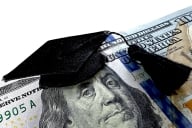You have /5 articles left.
Sign up for a free account or log in.

The future of higher education can be found at Creator, a new restaurant in San Francisco. Actually, 2 futures.
At Creator your burger is made by a robot.
From all the reviews, the burger looks to be delicious. And at $6, a terrific value.
Robot burger makers are also coming to higher education. They are called adaptive learning platforms.
There are many of these adaptive learning platforms on the market. My favorite is McGraw-Hill’s ALEKS (Assessment and Learning in Knowledge Spaces).
Adaptive learning platforms range today from very good, to absolutely horrible. Please share your experiences. If you spend time with a system like ALEKS, you can see how good these platforms can be, and where they will go in the future.
So here is our future of higher education.
On one side - let’s call it the expensive side - you will have: TECHNOLOGY + EDUCATORS
On the other side - let’s call it the cheap side - you will have: TECHNOLOGY
The middle will largely disappear. Higher ed, like almost everything else in society, will get more stratified as time goes on. Better overall, but also less equal.
A high quality education will be defined by the integration of excellent professors with advanced learning platforms. The professor’s role will change. She will mentor, coach, and flexibly assess. Rather than doing much lecturing, she will spend individual time with students. This personalized and relationship driven teaching will be informed by data. The adaptive learning platform will be a diagnostic tool, that will help the professor understand exactly what sort of individualized attention a student needs.
Freed up from having to cover the content - the adaptive learning platform does that - the professor can focus on making connections. Connections with the students. Connections across other domains of knowledge. Connections between the curriculum and the real-world applications of the knowledge.
In this high quality education scenario, the professor is more valuable than ever before. The robot - the adaptive learning platform - enables the professor to do the creative and relational work of teaching.
In the future, fancy (expensive) restaurants will follow the same robot + people plan. The robot will be in the kitchen, doing much of the work that was once done by people. The people will be in the front of the restaurant, providing individual attention to the customers. And the people will be in the kitchen, developing new dishes. (Research).
A cheap education will have only the robots. Only the adaptive learning platforms.
It is easy to imagine an inexpensive education where the professors are done away with. They can be replaced by lower-cost tutors. Or facilitators. Or maybe the professors will be kept, but the class size will grow so large that even with the robots (adaptive learning platforms) they will not be able to get to know the students as individuals. No relationships. No connections.
We will see an integration of open online learning (MOOCs) and adaptive learning platforms. This will be personalized learning at scale. It will be good relative to much of what we have across higher education today, but bat in comparison to tomorrow’s expensive (educator+technology) education.
Cheap restaurants will look much like cheap education. The robots will remain, the people will be gone. Many restaurants in the future will be operated by very few workers. Self-service will be the norm.
The point is that the robots will be present in both the expensive and the cheap restaurants. They are coming to both. The difference will be the people.
The robots are coming to higher ed as well. The best schools will invest in people (professors) + robots. Everyone else will just have the robots.
What sort of school do you want yours to be?








